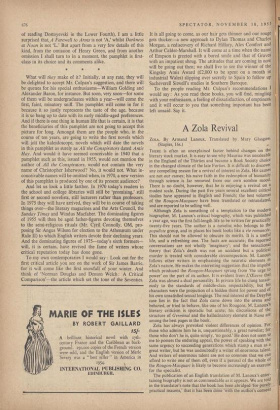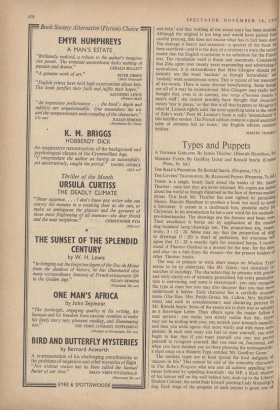A Zola Revival
ZOLA. By Armand Lanoux. Translated by Mary Glasgow. (Staples, 16s.)
THERE is often an unexplained factor behind changes on the literary stock market. It is easy to see why Mauriac was unsaleable in the England of the Thirties and became a Book Society choice in the changed climate of the late Forties. It is difficult to discover any compelling reason for a revival of interest in Zola. His causes are not our causes; his naive faith in the redemption of humanity through science is far removed from our own sombre mood. There is no doubt, however, that he is enjoying a revival on a modest scale. During the past five years several excellent critical studies have appeared in English and French; the best volumes of the Rougon-Macquart have been translated• or retranslated, and are reported to be selling well. Although Zola is something of a temptation to the modern biographer, M. Lanoux's critical biography, which was published a year ago, was the first full-length life to be written for practically twenty-five years. The author is a novelist who belongs to the populiste group, and in places his book looks like a vie romancee. This should not be allowed to obscure its merits. It is a useful life, and a refreshing one. The facts are accurate; the reported conversations are not wholly 'imaginary'; and the sensational theory that Zola's death was not an accident but a political murder is treated with considerable circumspection. M. Lanou% follows other writers in emphasising the neurotic elements in Zola's nature. He makes the interesting suggestion that the impulse which produced the Rougon-Macquart sprang from 'the urge to power' on the part of its author. It is evident from LTEuvre that Zola was almost a dual personality. In private life he clung tenael' ously to the standards of middle-class respectability, but his characters were the projection of a hidden thirst for power and of his own unsatisfied sexual longings. The real interest of the Dreyfus case lies in the fact that Zola came down into the arena and behaved, or tried to behave, like one of his Rougons. M. Lanowes literary criticism is sporadic but acute; his discussions of the structure of Germinal and the hallucinatory element in Nana are among the best pages in the book. • Zola has always provoked violent differences of opinion. For those who admire him he is, unquestionably, a great novelist; for those who don't he is, quite simply, 'no good.' He does not seem to me to possess the enduring appeal, the power of speaking with the same urgency to succeeding generations which stamp a man as a great writer, but he was undoubtedly a writer of\ enormous talent. And writers of enormous talent are not so common that we can afford to write one of them off, even if a perusal of the whole of the Rougon-Macquart is likely to become increasingly an exercise for the specialist.
The publication of an English translation of M. Lanoux's enter- taining biography is not as commendable as it appears. We are told in the translator's note that the book has been abridged 'for purelY practical reasons,' that it has been done 'with the author's consent and help,' and that 'nothing of the actual story has been omitted: Although the original is too long and would have gained frail' careful pruning, this does not excuse what has in fact been done. The damage is heavy and extensive—a quarter of the book has been sacrificed—and it is the duty of a reviewer to warn the serious reader that the English translation is no substitute for the French text. The translation itself is fluent and inaccurate. Considering that Zola spent over twenty years expounding and advertising le naturalisme, it is extraordinary that Miss Glasgow should pet; sistently use the word 'realistic' as though 'naturalistic' an° 'realistic' were synonymous terms. This is typical of her treatment of key-words. There is some discreet bowdlerising. Some though not all of it may be unintentional. Miss Glasgow may really hart thought that, even in its context, une verge d'homme means man's staff': she cannot possibly have thought that imascidel means 'tear to pieces,' or that this is all that happens to Maigrat In what M. Lanoux rightly calls 'the most appalling scene in the whole of Zola's work.' Poor M. Lanoux's book is sadly 'emasculated' in this ladylike version. The French edition contains a good analytical table of contents bin no index : the English edition contains neither. MARTIN TURNE0











































































 Previous page
Previous page